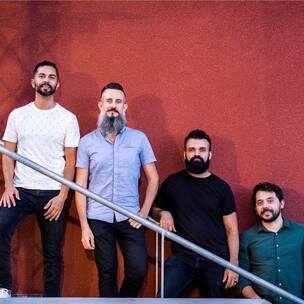
On July 23,2020, Farofa headlined the Omaha Performing Arts live streaming concert that opened with the Omaha Guitar Trio—a 10-year-old trio—who performed admirably for 30 minutes. After a brief intermission, Farofa took the stage at the 56:30 mark.
Farofa is comprised of violinist Luis Mascaro, guitarist JP Mourão, bassist Isaias Elpes, and drummer/percussionist Felipe Fraga. The band is from Brazil but are all based in Los Angeles now. This band smokes. Even behind the PPE masks, you can tell that smiles were in abundance.
Farofa’s set opened with their original tune, Pacific Wind. Is FAROFA Jazz? Undoubtedly. But they also pull in influences from so many other spheres. Mascaro reveals his classical training and influence and Mourão, Elpes, and Fraga keep a tight foundation and rhythm for Mascaro’s wanderings.
The tune is captivating and the performance is brilliant.
Taca is another Farofa original and was an excellent follow-up to Pacific Wind. Fraga the drummer, who also does most of the introductions, is a marvelous drummer and worth watching, as well as hearing. Mourão turns in an excellent lead guitar solo before the band plays in corps. Watch Elpes on bass.
Third in the set was Egberto Gismonti’s Frevo which first appeared on his 1985 album, Solo, and was rereleased on his 1996 album Alma. Farofa does fantastic tribute to Gismonti’s composition and spirit. By the end of this piece, I was firmly a fan of Farofa.
Their energy is contagious, the passion unmistakable, and their precision flawless. The interplay of each and every one of the artists is intriguing and together they create music that can only be described as rapturous.
Lamento Sertanejo by José Domingos de Morais better known as Dominguinhos features amazing acoustic guitar work from JP Mourão who is joined by Mascaro’s violin. Mourão and Elpes team up in the corner and create moments of sheer brilliance between them. Fraga is as solid as you could ever hope. With episodes of solos, leads, and duos, the band closes the song in unison and it is electrifying.
The band departs from the Brazilian originals by turning to Pat Metheny’s Timeline but, by the time they are done, you’d swear Metheny was Brazilian. It is a beautiful alteration of—if not altercation with—the original. The rhythms make all the difference, as always. Mourão outs a sweet spin on the Metheny guitar bits and Eples turns in a fine, fine, fine bass solo. This was a fun piece.
Farofa returned to their originals with Regent Street which is introduced by a lyrical guitar and violin passage. The andante pace creates the mood of a stroll with textured highlights from everyone. Fraga’s drum interlude is not so much a solo as a pause for reflection. The melody is intoxicating and the song itself is just far too short. I wanted it to go on and on.
The concert set closed with what Fraga called “a mashup of two great Brazilian composers.” Assanhado by Jacob do Bandolim and Linha de Passe by João Bosco. Fraga reintroduced the band and the sense of sadness that the concert was closing was unmistakable. Fraga opened the piece with wonderful percussive work on the drums using one stick and one bare hand. That alone was worth the price of admission. At Fraga’s decrescendo, Mourão joined in before being accompanied by Mascaro’s violin. Elpes jumped on board with his bouncing bass and the “mashup” was remarkable.
It was a joyous romp that was energetic, spirited, fascinating, and leaving you wanting more. Farofa is a new band with original compositions and original takes on old songs. Farofa pulls the listener up to their level and makes you crave their understanding of life in the world we live.
Find them on their web page at farofatheband.com, their own YouTube channel, Facebook, Soundcloud, and Spotify.
~Travis Rogers, Jr. is The Jazz Owl
 RSS Feed
RSS Feed
